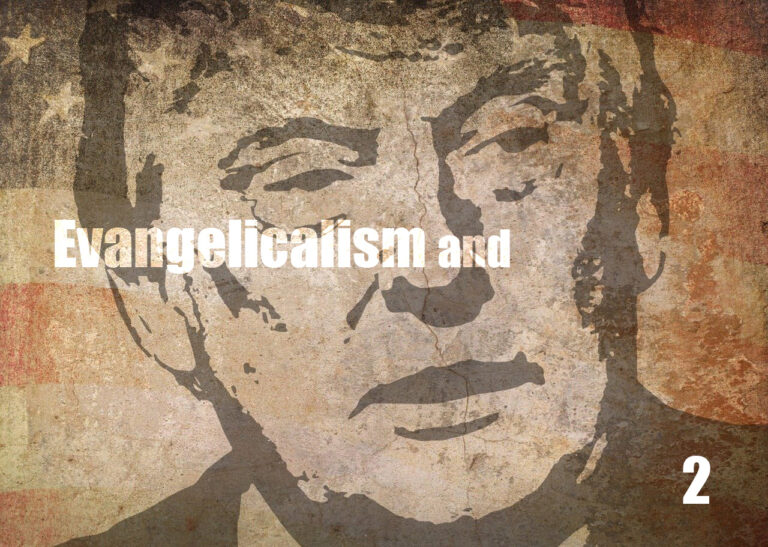I suspect it is only possible to understand a culture when you were born in it and have lived there for most of a lifetime. I have American relatives, my brother lived and worked there for many years, and I have visited many times – experiencing the cultural differences and contrasts between north, south, east and west. America fascinates and repels me in equal measure. But I can’t claim to understand the forces that drive the political polarisation that has grown over recent years.*1 I’m therefore going to let some figures speak for themselves.
The statistics below are drawn from a recent Pew Research survey of 12,693 American adults who were randomly selected, with a weighting applied so that participants were representative of the U.S. adult population by gender, race, ethnicity, partisan affiliation, education, religious affiliation and various other categories.
The headline statistic I am most interested in tells us that “two-thirds of White evangelical Protestants say they have a favourable view of Donald Trump, including 30% who have a very favourable opinion of him. Roughly half of White Catholics (51%) express positive views of Trump, as do 47% of White non-evangelical Protestants and 45% of Hispanic Protestants.” That a majority of white evangelicals and Catholics favour the Republican party is no surprise historically, but it is the rise in Donald Trump’s popularity since 2016 that is most notable. Set against these figures are the 88% of atheists, 82% of agnostics, 80% of Black Protestants and 79% of Jewish Americans who have a unfavourable opinion.
Attempts have been made to suggest that it is ‘cultural’ Christians who are loyal to Trump, but this isn’t borne out by the figures. Going to church doesn’t make someone a Christian but being an active church-goer is the best pollsters can do to justify their conclusion that a self-identified Christian is taking their faith seriously. The figures tell us that 47% of regular church-goers favour Trump, and 46% of non-regular church attenders who nevertheless define themselves as Christians are supportive. For white evangelicals the proportions are 68% and 64% respectively.
“The only exception to this pattern is among White Protestants who do not identify as born-again or evangelical. In this group, Trump is viewed more favourably by those who don’t attend church regularly than by those who do (52% to 32%).” Self-identified Christians who go to church are slightly more likely to vote for Donald Trump than those who stay at home.
The first indication we get as to why evangelical Christians feel as they do is suggested by responses to the question regarding whether people believe Donald Trump has a religious faith of his own. “Most people who view Trump positively don’t think he is especially religious himself. But many think he stands up for people with religious beliefs like theirs. Just 8% of people who have a positive view of Trump think he is very religious, while 51% think he is somewhat religious and 38% say he is not too or not at all religious.” Despite this, 51% of those with a favourable view of Trump think he stands up for people with religious beliefs like their own.
Moving away from questions about the former President gives us some more general insights into what might be driving Americans to believe what they do about him. The Pew survey recorded that of 57% of adults in the USA expressed a positive view of religion’s influence on American life. When asked whether the role of religion in American life was shrinking, 80% of American adults believed it was, and 49% of American adults felt this to be a bad thing. This is the highest percentage ever to have been recorded expressing these views.
Another growing feeling was the 48% of American adults who “say there’s “a great deal” of or “some” conflict between their religious beliefs and mainstream American culture” (up from 42% in 2020). A further 29% say they think of themselves to be in a religious minority.
Our final statistic suggests an increasing religious polarisation, which might account for the embattled stance of such a large proportion of American evangelicals who see either themselves, or their strongly-held opinions, as losing ground. In the 2024 survey 72% of religiously unaffiliated adults – those who identify, religiously, as atheist, agnostic or “nothing in particular” – say conservative Christians have gone too far in trying to impose their own religious views through the government and public schools. This is juxtaposed against the 63% of Christians who say the same about secular liberals.
The headline that journalists love is that those who identify as white evangelical Christians are most likely to be a fervent supporters of Donald Trump. In April 2024 84% of White evangelical Protestant voters who are regular churchgoers said they would vote for Trump, meaning that four years after the former President was beaten (or was he?) by Joe Biden, a larger percentage than ever of evangelicals seem intent on voting for him again. The statistics support the headline, but I think there are other more important stories to be told.
My coming posts in this series will examine the relationship between American evangelicals, politics and power, the dangers that arise when personal moral convictions become the stuff of a national evangelical crusade, and how we each should live if we find ourselves resonating far more strongly with the beliefs and lifestyles of those who are not of our tribe than those who share a similar label.
*1 In case I appear to be a glasshouse dweller throwing stones, I am fully aware that this charge applies to the UK just as much as it does to the USA. I’ll come on to that later.
*2 All quotations and statistics in this post are taken from this survey: https://www.pewresearch.org/short-reads/2024/03/15/5-facts-about-religion-and-americans-views-of-donald-trump/


